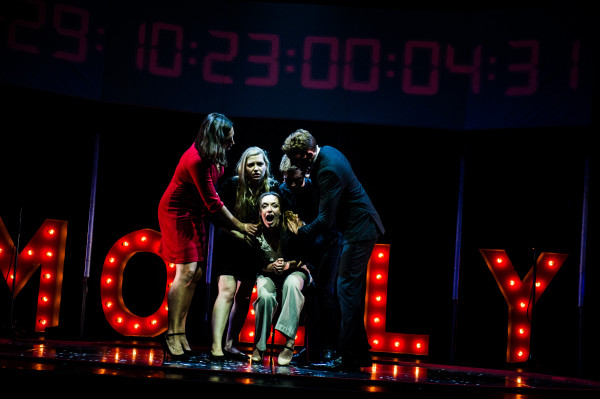In the style of a This is Your Life game show, Molly is going to get the chance to tell her story. The only problem is Molly is a sociopath and we’re told by our hosts “Molly isn’t feeling like herself.” We are encouraged to cheer for our unseen contestant, to not believe everything she says, and to judge her for ourselves. When she arrives on stage, with blood on her shirt, it’s clear something terrible has happened.
The way in which the game show structure is paired with an ominous, thriller tone, makes Molly an ambitious undertaking. And though Squint, don’t quite manage to pull off the whole gambit, it’s a valiant and impressive effort. There are moments of real painful pleasure in this production, particularly from Lizzie Clarke as Molly.
The play charts Molly’s life from age three to twenty-nine. Fran Regis and Rhys Isaac-Jones play Molly’s classmates and friends as they grow from schoolchildren to teens and they excel at portraying convincing children and adjust their performances appropriately as their characters age.
In these formative years we see Molly at her most extreme. She’s manipulative, brilliant, and mercurial. Molly, as played by Clarke, is overcome with rage, pleasure, or despair and you can feel all these throbbing, pulsing emotions radiate from Clarke’s entire body. It’s a magnetic performance of a character that is radically unhinged and yet Clarke still stays within the bounds of believability.
However, the same cannot be said for the storytelling. This chilling tale does not quite hold together through writing and direction. The play taunts us with what’s going on and why Molly is the way she is, but that dramatic tension fails to remain taut throughout. The shading of how a sociopath functions (or really doesn’t function) seems easier to read through an impulsive child. But as a successful adult one wonders how Molly has managed to keep her impulses in check. Because we fast-forward through the teen to adult years of Molly’s life through dance and movement, this never gets answered.
Though I’ve seen choreography mark the passage of time and set up an exciting visual landscape in other Frineg shows (Down and Out in Paris and London does so with charming panache), here the choreographed sequence doesn’t deliver the structural story links we need and it sticks out because it’s the first and really only time movement supplants dialogue in the play. But that stylistic choice is less of a problem, the real issue is one of narrative. The dance and movement do not clearly express what is going on in Molly’s life during these years (it speaks vaguely of her going to college, maybe, going out partying, maybe, getting a job, I wasn’t sure).
We leave Molly’s childhood at a particularly dark moment with her childhood friend Laura (Fran Regis). Laura remains Molly’s friend in adulthood but because of this dance blur in the middle os the show we do not have more than a glimmer of how these characters have bridged that gap. It need not be a neat package, but this murkiness does not help maintain the energy or anxiety the piece aims for and makes the second half of the play less satisfying as a result.


